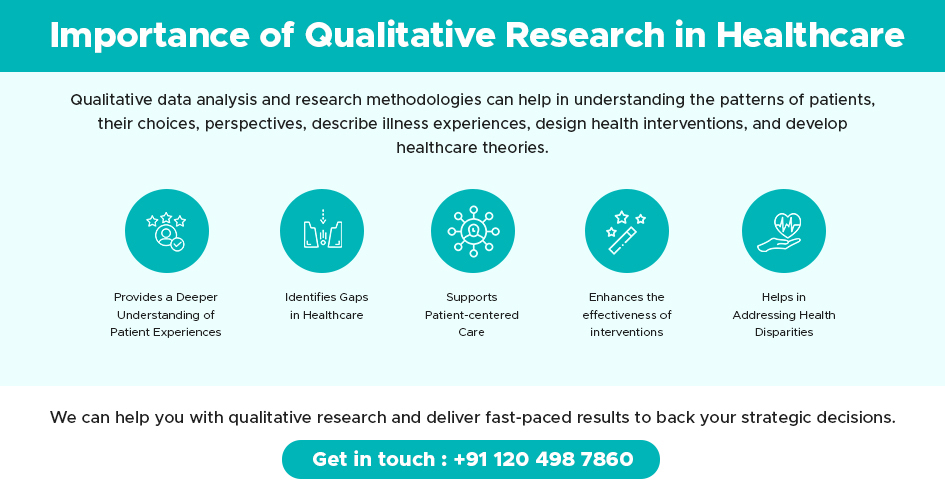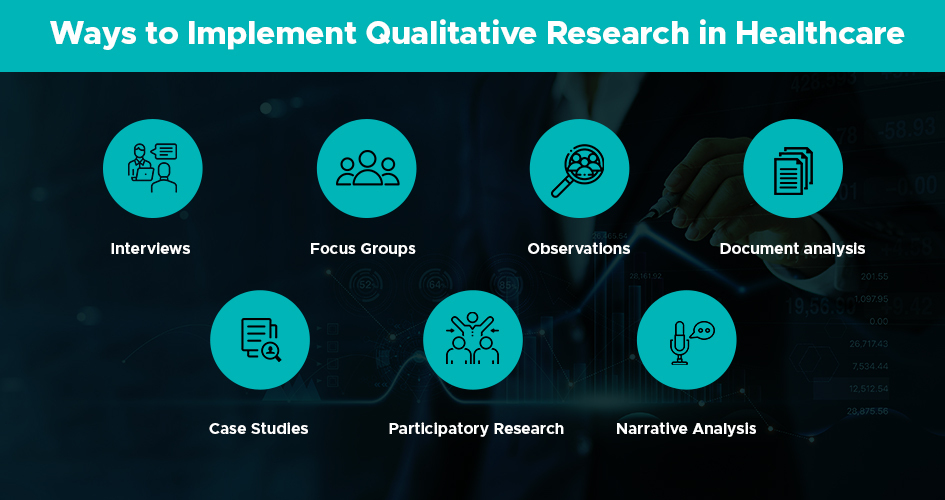When it comes to understanding a human, especially in making choices for themselves, the why triumphs over the what. This is why qualitative research plays an important role in identifying and reporting the choices. And when it comes to the healthcare sector, the whole study takes shape as there are multiple factors that affect the decision of choosing a healthcare organization for themselves.
In the qualitative content analysis, the study groups are made and the findings from the people are sorted, analyzed, and recorded to identify the anomalies among members to understand what compels them to make their choice.
Through the right qualitative research methods, the researchers can identify and understand what the customers need and how their experience can be improved. The healthcare provider can choose the qualitative research for the further improvement through the collection and interpretation of patient perspectives.
What is Qualitative Research?
As the name suggests, the qualitative research focuses on the quality and derives the result based on the experiences of the patients.
Qualitative research in healthcare is a research methodology that aims to explore and understand the subjective experiences, attitudes, beliefs, and behaviors of individuals and groups in healthcare settings. It involves collecting and analyzing non-numerical data through methods such as interviews, focus groups, observations, and document analysis.
The goal of the qualitative research approach is to provide a rich, detailed, and nuanced understanding of the social, cultural, and contextual factors that shape health and healthcare. The data derived through qualitative research can help in the development of healthcare policies, organizations, and services that are more responsive to the needs and perspectives of patients, families, and healthcare providers.
Why is Qualitative Research Important in Healthcare?

| Importance of Qualitative Research in Healthcare |
Qualitative data analysis and research methodologies can help in understanding the patterns of patients, their choices, perspectives, describe illness experiences, design health interventions, and develop healthcare theories.
We can help you with qualitative research and deliver fast-paced results to back your strategic decisions. Get in touch (Add contact number) |
Qualitative research is important in healthcare because it provides a deeper understanding of patient experiences, supports patient-centered care, identifies gaps in the healthcare sector, enhances the effectiveness of developing drugs, and helps to address health disparities.
Here are some more reasons why qualitative research is important in healthcare:
1. Provides a Deeper Understanding of Patient Experiences
Qualitative research allows researchers to explore the subjective experiences of patients, which can provide the complete understanding of the patient’s perspective. Qualitative data analysis helps in collecting data based on the patient experience and is unadulterated as it directly comes in from the patients who have been in the setting.
2. Identifies Gaps in Care
Qualitative research can identify gaps in care by exploring patient experiences and uncovering barriers in patient care. Once the care gaps are identified, these can be filled by the developing healthcare organizations and other healthcare facilities for the betterment of the patients.
3. Supports Patient-centered Care
Qualitative research can boost patient-centered care by providing a better understanding of patients’ needs, preferences, and values through the data collected. These can also push the healthcare organizations to be more responsive to the patient needs.
4. Enhances the Effectiveness of Interventions
Interventions in healthcare like development of a new drug, or an upcoming healthcare organization can provide effective healthcare measures if they have the record of the patient’s perspective. Qualitative research can be used to understand how patients and healthcare providers interact with these interventions and how effective they are when implemented.
5. Helps in Addressing Health Disparities
Qualitative research can be used to explore the experiences of marginalized populations. This can bring them in notice of the healthcare developments and the upcoming policies can address health disparities of the population which were once unnoticed.
Ways to Implement Qualitative Research in Healthcare

Qualitative research method is useful for gaining a deeper understanding of the experiences, attitudes, and behaviors of patients, healthcare providers, and other stakeholders in healthcare. There are several methods that can be used to implement qualitative research in healthcare, including the following:
1. Interviews
One of the best ways of qualitative data analysis is conducting in-depth interviews with patients, healthcare providers, or other stakeholders that can provide insights into their experiences, attitudes, and beliefs. These interviews can happen over the phone, or online. Structured interviews typically involve a set of predetermined questions, while unstructured interviews are more flexible and allow for more open-ended responses.
2. Focus Groups
Focus groups bring together a small group of patients or healthcare providers to discuss a specific topic or issue related to healthcare. The group dynamic can allow for the exploration of different perspectives and experiences, as well as the identification of common themes and issues.
3. Observations
Observing the behaviors and interactions of patients or healthcare providers in healthcare settings can provide insights into their experiences. Observations can be conducted in a variety of settings, including clinics, hospitals, and homes, and can be structured or unstructured.
4. Document Analysis
Analyzing documents such as medical records, policy documents, or other healthcare-related materials can provide insights into healthcare practices and policies. Document analysis can be used to explore issues such as access to care, quality of care, and patient outcomes.
5. Case Studies
Conducting a detailed examination of a single case, such as a patient or healthcare provider, can provide insights into the unique experiences and perspectives of that individual. Case studies can be used to explore issues such as patient-provider communication, patient experiences with chronic conditions, and the impact of healthcare policies on individual patients.
6. Participatory Research
Engaging patients or other stakeholders as partners in the research process can ensure that their perspectives are represented and valued. Participatory research can involve co-designing research questions, data collection methods, and data analysis, as well as the dissemination of research findings.
7. Narrative Analysis
Analyzing stories or narratives told by patients or healthcare providers can provide insights into their experiences and perspectives. Narrative analysis can be used to explore issues such as patient experiences with chronic conditions, the impact of healthcare policies on individual patients, and the experiences of healthcare providers in delivering care.
These methods can be used individually or in combination to gain a comprehensive understanding of the experiences, attitudes, and beliefs of patients, healthcare providers, and other stakeholders in healthcare. It is important to choose the appropriate method based on the research question, the population being studied, and the resources available.
Is Qualitative Research Reliable for Studying the Healthcare Market?
Qualitative research approach can be a reliable method for conducting healthcare market studies, depending on the research question and the approach used. The correct use of qualitative research methods can provide valuable insights into the experiences, opinions, and attitudes of patients, healthcare professionals, and other stakeholders, which can facilitate the development of healthcare organization, services, products, and policies.
However, it’s important to recognize that qualitative research may have limitations. For example, the sample size may be small, and the findings may not be generalizable to a larger population. The research process may also be subject to bias, such as interviewer bias, respondent bias, or researcher bias.
To address these limitations, qualitative research studies should be designed and conducted using rigorous methods that are appropriate for the research question and population being studied. For example, researchers can use purposive sampling methods to ensure that the sample is representative of the population of interest, and they can use techniques such as triangulation to validate the findings. Researchers can also employ multiple coders to reduce the risk of individual bias.
How Does Qualitative Data Analysis Help in Decision Making in the Healthcare Sector?
Qualitative data can help decision making in the healthcare sector in several ways.
Firstly, qualitative data can provide in-depth insights into the experiences and perspectives of patients, healthcare professionals, and other stakeholders, which can inform the development of healthcare products, services, and policies. For example, qualitative research can identify unmet needs, preferences, and barriers to accessing healthcare services, which can help healthcare organizations to design more patient-centered and effective interventions.
Secondly, it can help to identify emerging trends, patterns, and themes that may be missed by quantitative research. Qualitative research can provide a deeper understanding of complex issues, such as the social and cultural context in which healthcare is delivered, which can inform more nuanced decision making.
Thirdly, the data collected by the qualitative research methods can be used to evaluate the implementation and impact of healthcare interventions. Qualitative research can provide feedback on how interventions are being received by patients and healthcare professionals, identify areas of success and areas for improvement, and inform ongoing quality improvement efforts.
Grow Your Patient Base With the Best Qualitative Research Company
Our data research specialists are situated in important research markets for the gathering of local data, which, when combined with the top-notch research facility, ensures success.
Our staff of 4 million+ panelists uses a consulting approach to assure your success in any nation if you are aiming for the global market. Because of our affiliation with international strategic partners, you will only have one point of contact for the entire project.
With the help of excellent online qualitative research platforms and project management, we provide the best outlook regardless of whether you are a major market player or a start-up, or whether you need a comprehensive solution or limited insight. Contact us to learn more about how our qualitative research may help in the expansion of your company if you’re keen on qualitative analysis for healthcare.